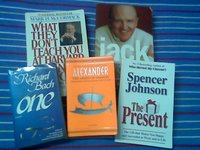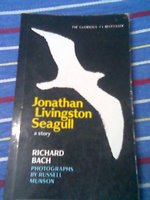
I am not a big philosophical books fan or anything. In fact i dont like anything that is philosophical. I am a typical 'sheldon' or 'grisham' type books reader. I used to think only murder and conspiracy stories make up novels.
But just a few days back an uncle of mine gave me some of his books to read. There were a couple of Massimo Manfredis (one who  wrote the Alexander trilogy), a couple of Richard Bachs (totally philosophical), The present by Spencer Johnson (the author of Who moved my cheese) and another couple of Autobiographies. The first thought that came to my mind after I saw the books was-- Are these really novels?? I read a few paras from each book to get an idea of what it is. Though philosophical or historical, they did look like stories. So I decided to give it a try. I took a thinnest book of it all. That was Jonathan Livingston seagull by Richard Bach.
wrote the Alexander trilogy), a couple of Richard Bachs (totally philosophical), The present by Spencer Johnson (the author of Who moved my cheese) and another couple of Autobiographies. The first thought that came to my mind after I saw the books was-- Are these really novels?? I read a few paras from each book to get an idea of what it is. Though philosophical or historical, they did look like stories. So I decided to give it a try. I took a thinnest book of it all. That was Jonathan Livingston seagull by Richard Bach.
 In that book the reader is first introduced to Jonathan Livingston Seagull, one of many gulls belonging to some kinda gull colony where the gulls spend their time fighting for scraps of food and bread. Jonathan Seagull, instead of fighting and stealing food from human boats like all the others, spends his time practicing to fly, something he is really interested in. He doesn't understand the practicality of such monotonous day-to-day activities. Rather, he attempts to perfect his flying abilities. Eventually he becomes the first gull to reach terminal velocity at 214 miles/hour. The other gulls kick him out of the colony and makes him an outcast. He still decides to live alone and go on with his dream of flying the first aerobatics of any seagull on earth.
In that book the reader is first introduced to Jonathan Livingston Seagull, one of many gulls belonging to some kinda gull colony where the gulls spend their time fighting for scraps of food and bread. Jonathan Seagull, instead of fighting and stealing food from human boats like all the others, spends his time practicing to fly, something he is really interested in. He doesn't understand the practicality of such monotonous day-to-day activities. Rather, he attempts to perfect his flying abilities. Eventually he becomes the first gull to reach terminal velocity at 214 miles/hour. The other gulls kick him out of the colony and makes him an outcast. He still decides to live alone and go on with his dream of flying the first aerobatics of any seagull on earth.
--"You can go to any place and to any time that you wish to go," the Elder said. "I've gone everywhere and every place I can think of." He looked across the sea. "It's strange. The gulls who scorn perfection for the sake of travel go nowhere, slowly. Those who put aside travel for the sake of perfection go anywhere, instantly.”
Well.. Having learnt a lot from this book, I was almost about to change the way I used to think about philosophical books until I read the latter half of the book. Here are some lines from it—
--"We can start working with time if you wish," Chiang said, "till you can fly the past and the future. And then you will be ready to begin the most difficult, the most powerful, the most fun of all. You will be ready to begin to fly up and know the meaning of kindness and of love."
--"I don't understand how you manage to love a mob of birds that has just tried to kill you."
"Oh, Fletch, you don't love that! You don't love hatred and evil, of course. You have to practise and see the real gull, the good in everyone of them, and to help them see it in themselves. That's what I mean by love. It's fun, when you get the knack of it.”
